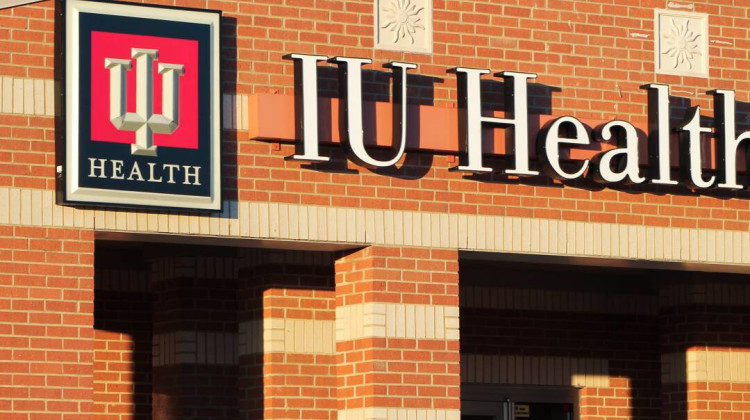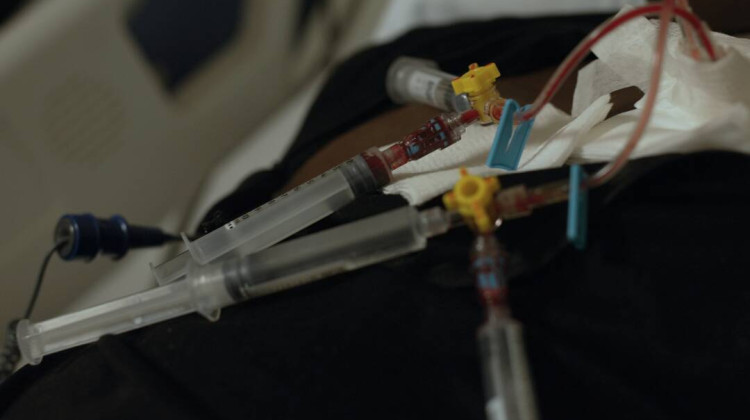
Since Jan. 1, Indiana has averaged about 54 deaths and 12,832.7 cases per day.
(Lauren Chapman/IPB News)The Indiana House votes to effectively ban COVID-19 vaccine mandates, sending it to the Senate. Indiana hits one year since it fully vaccinated its first resident. And Indiana surpassed 1.5 million confirmed COVID-19 cases, with some early signs of slowing.
THE DATA
Indiana surpassed 1.5 million confirmed COVID-19 cases Thursday and set a new pandemic record Friday – more than 17,000 cases reported in a single day.
In November, the state averaged 2,707.1 new cases per day. But in December, when the omicron strain was making its way through the U.S., that grew to 5,192.9. For January so far, the state is averaging 12,579.0 cases per day.
But there are some early positive signs the state is approaching its omicron peak: the state’s two largest counties – Lake and Marion counties – are seeing cases start to drop. And after exponential increases for the last four weeks, cases this week are less than 1,500 higher than last.
In the last week, the Indiana Department of Health added 501 new deaths to its total.
Indiana fully vaccinated its first Hoosier a year ago. Where are we now?
Indiana fully vaccinated its first Hoosier on Jan. 18, 2021. But where does the state stand now?
In the past year, Indiana has fully vaccinated 3.6 million Hoosiers, accounting for 53.2 percent of the state’s total population.
That makes the state worst among our immediate neighbors, according to the Centers for Disease Control and Prevention. Illinois has fully vaccinated 65.1 percent of its residents, Michigan 57.5 percent, Ohio 56.0 percent, and Kentucky has vaccinated 54.9 percent.
In fact, Indiana is among the 10 worst states for the percent of its total population fully vaccinated.
Current COVID-19 surge also affects Indiana prisons
COVID-19 cases are on the rise in Indiana’s prisons. In early January, fewer than 100 incarcerated people had the virus. As of Wednesday, the Indiana Department of Correction reported 571 positive cases.
The two facilities with the most cases are women’s prisons: Rockville Correctional Facility has 106 cases, and the Indiana Women’s Prison in Indianapolis has 100.
IDOC spokesperson Annie Goeller said in an email that no one with COVID is hospitalized, and the IDOC has not reported any COVID-related deaths in 2022. Since the start of the pandemic, 43 incarcerated individuals have died of COVID-19 in Indiana, and an additional 12 are presumed to have died of the virus.
As of Dec. 30, 2021, the IDOC reported that 71 percent of the incarcerated population is fully vaccinated. That’s higher than the state as a whole – 53 percent of Hoosiers are fully vaccinated, according to the Indiana Department of Health.
THE HEADLINES
Expanded ICU capacity ‘new norm’ for hospitals navigating two years of COVID-19
It’s normal for hospitals to expand intensive care unit capacity, especially during flu seasons. To do so requires health care staff, supplies and space. But hospitals say they’ve already been running at capacity for the last two years, largely because of the effects of COVID-19.
Dr. Mark Luetkemeyer is the chief medical officer for the IU Health Adult Academic Health Center – which includes Methodist and University hospitals in Indianapolis. He said hospitals try to keep about 20 percent of their ICU beds open to make sure there is space available for patients.
Join the conversation and sign up for the Indiana Two-Way. Text "Indiana" to 73224. Your comments and questions in response to our weekly text help us find the answers you need on COVID-19 and other statewide issues.
During flu and other respiratory virus seasons, that buffer is usually enough to provide care for patients. But for the last two years, ICUs have been using that buffer because of COVID-19.
“So it’s not that we’re surging in additional ICU areas. That’s become our new norm – unfortunately – is a solid state of surge,” he said.
Indiana House passes effective ban on COVID-19 vaccine mandates
The Indiana House voted Tuesday to effectively block private companies from enforcing COVID-19 mandates.
The measure, HB 1001, says businesses have to grant exemptions from getting the vaccine to employees who request them on a medical or religious basis or who have contracted the virus within six months.
It also says if someone is fired even after requesting a COVID-19 vaccine exemption, they can receive unemployment benefits.
And it includes provisions, requested by Gov. Eric Holcomb, that will allow him to end the state's public health emergency without losing access to millions in federal funding tied to the pandemic.
Rural Hoosier communities rally as COVID-19 worsens child care crisis for parents, providers
The sounds coming from inside Perry Preschool and Child Care on this brisk fall morning suggest just how hectic things are today. Two staff called in and aren't coming to work, while a third is taking a pre-planned day off.
Paige Schank is the chief financial officer for the Tell City Electric Department. This isn't her typical morning; today she's using vacation time to volunteer at the center where her two kids come for care.
"So I was in an 8 o'clock meeting, the meeting got over, I told my boss. Thankfully, he's very, very understanding. And I've been here the last three hours – in ratio," she said.
That ratio is important, because licensing rules limit the number of kids per staff member in each room. Without Schank here, the center would have been forced to turn families away at the door this morning.
It's happened before.
"The world stops, and you're like, 'this is way more important than I thought it was at first,'" Schank said. "You don't know how bad you need it until it's gone."
The center is so understaffed, it's been closed just as often as it's been open in the past six months. But Schank being here isn't a fix-all; she can't volunteer in the rooms her kids are in, and she has to go back to her actual job soon.
Erin Emerson is the executive director of the Perry County Economic Development Corporation, and is the president of Perry Preschool and Child Care's volunteer board. There's a sense of despair and exhaustion in her voice as she describes what it's been like running the center lately.
"COVID added an entirely new layer of difficulty to something that was already impossibly difficult," she said.
Hoosiers demand protections for renters during Tenants Day of Action at the Statehouse
Hoosiers from across the state gathered at the Indiana Statehouse Thursday to demand legislation to protect tenants. Organizers created Tenants Day of Action to give renters a way for their voices to be heard.
Since the start of the pandemic in March 2020, Prosperity Indiana policy director Andrew Bradley said he estimates more than 1 in 10 Hoosier households have had an eviction filed against them.
"That is way too many people and no wonder we have so many folks here today who are telling us that there's not enough stable housing in Indiana," said Bradley.
Contact Lauren at lchapman@wfyi.org or follow her on Twitter at @laurenechapman_.
 DONATE
DONATE






 Support WFYI. We can't do it without you.
Support WFYI. We can't do it without you.